Scott Morrison meets Donald Trump at G7, urges US, China to resolve trade war
Scott Morrison lends support to Donald Trump over the trade crisis but says it must be resolved quickly.
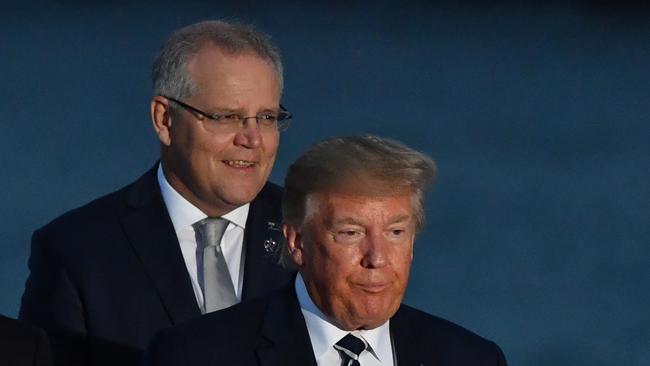
Scott Morrison has lent support to US President Donald Trump over the escalating trade war with China claiming that the US had “legitimate issues” but said it needed to be resolved quickly with collateral damage threatening to hurt the Australian and other third party economies.
The Prime Minister confirmed he had raised the issue during a 20-minute meeting with President Trump and US officials on the sidelines of the G7 summit in Biarritz France, after which President Trump humourosly described Mr Morrison as “the King of Australia”.
“We have had a good discussion about the US/China trade exchanges … what I’d simply say is that the US has raised a number of issues for some time now with China and China has raised some matters. It’s up to those two countries to sort it out and come to an agreement,” Mr Morrison told reporters.
MORE: No warning on Iran foreign minister visit | Trump's regrets on China row
“And I’ve always hopeful that they will be able to do that and of course we’d like to see that happen sooner rather than later … obviously it has a broader impact on the global economy
“Equally you can’t just brush these issues aside … they have to be dealt with and we obviously want to see that happen … we want to see the matter resolved.
“The US has legitimate issues they wish to pursue as part of that trading relationship … it’s not for us to dictate to them any more than it is to China what they should be concluding … it’s just more broadly in everyone’s interests that they proceed to a conclusion.
“They are taking responses in relation to a disagreement they are having over trade matters …these sort of responses are fairly obvious in how they will play out and until they are resolved.”
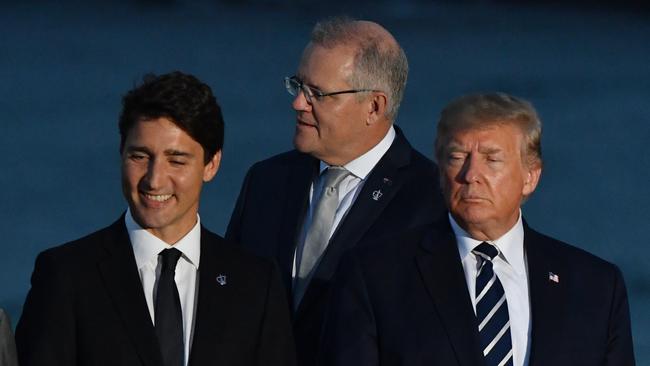
Australia is attending as an observer state to the G7 with the summit formally confined to the US, UK, Canada, Japan, France, Italy and Germany and originally formed primarily in response to the 1973 oil crisis.
However, in a sign of Australia’s growing status among global powers, Mr Morrison’s meeting with President Trump was elevated to an official engagement and included US National Security Advisor John Bolton, Acting White House Chief of Staff Mick Mulvaney, and senior advisor Jared Kushner.
Australian officials included the PM’s chief of staff John Kunkel, national security advisor Michelle Chan and PM’s executive officer Nico Louw.
The meeting took place after President Trump had sent mixed messages over his row with China claiming he was having “second thoughts” about the latest round of tit for tat tarrif hikes which are threatening to further impact the global economic outlook.
After being interpreted as a softening in the US position, The White House later clarified the remarks to mean the president had in fact been referring to having second thoughts on whether he should have gone harder on China.
Mr Morrison also talked up Vietnam’s emerging role in the region during discussions in with Mr Trump. Vietnam is currently engaged in a hostile maritime dispute with China.
“I’ve just come from Vietnam to this and was able to have a good conversation about the engagement I had with Vietnam and the positive role they are playing in the Indo pacific,” Mr Morrison said.
“And the strength of their economy and the opportunities they are seeking to develop in that part of the world and obviously the presence of the US in the indo pacific is a stabilizing one and good for peace and security.”
Mr Morrison said Mr Trump expressed his gratitude for Australia’s military commitment to the international coalition to protect shipping in the Strait of Hormuz while touching on the Hong Kong protests and North Korea.
It was expected that the trade war between the US and China would dominate broader discussions at the G7, but Mr Trump appeared to signal regret yesterday for the deepening tensions, amid growing concerns about the prospect of a global economic slowdown.
During a breakfast meeting with British Prime Minister Boris Johnson, Mr Trump suggested he had qualms about the spiralling conflict. “Yeah. For sure,” he said, adding that he had “second thoughts about everything”.
But several hours later, White House press secretary Stephanie Grisham said Mr Trump’s answer had been “greatly misinterpreted”. In a statement, she said, “President Trump responded in the affirmative — because he regrets not raising the tariffs higher.”
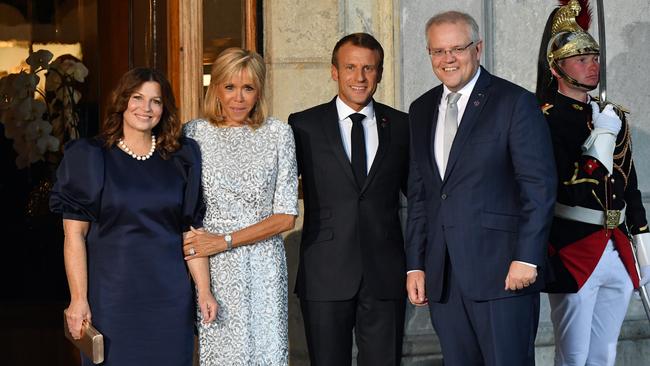
Following Beijing’s announcement on Friday that it would slap new tariffs on $US75 billion ($111bn) in American goods, Mr Trump responded with more tariffs of his own and issued an extraordinary threat to declare a national emergency in an attempt to force US businesses to cut ties with China. In a series of angry tweets hours after China’s move, Mr Trump said: “We don’t need China and would frankly be far better off without them.”
Mr Morrison is also using the G7 forum to try to head off a European push, led by France, for an international tax standard to be applied to digital companies such as Google and Facebook because of fears it could be extended and hit Australia’s commodity exports.
“Australia is on the leading edge in the world on dealing with digital platforms,” he said.
“This is what I want to share. The big thing I’m trying to push is that all we want is for them to be subject to the same rules as everyone else in the physical world … whether that is paying taxes, respecting consumer laws to tackling online violent extremism and terrorism.”
The push from France for changes to international tax standards would tax the domestic revenue base of digital companies within a country even if their headquarters were located elsewhere.
The French proposal, dubbed the “Google tax”, has been attacked by Mr Trump, who has threatened to impose tariffs against France in retaliation.
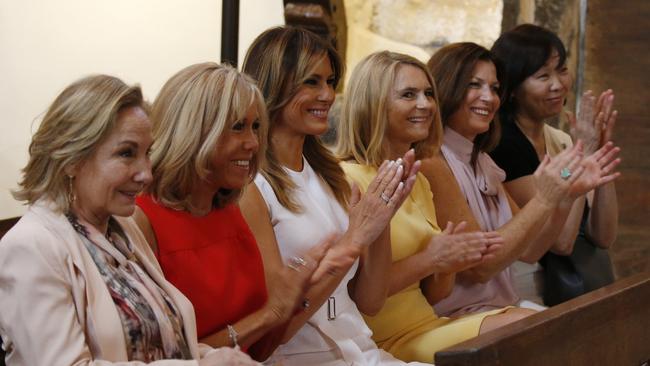
However, Mr Morrison sought to enlist the support of the OECD in blocking the European model, with Australia using the G7 to argue that the proposal could potentially be extended beyond digital companies to capture other areas of trade, including Australia’s commodities sector. He conveyed his concerns about the tax proposal with German Chancellor Angela Merkel yesterday.
The Prime Minister has already notched up a win at the summit, which Australia is attending for the first time as an observer state, striking agreement with the OECD to fund new protocols around digital companies to prevent, detect and remove violent extremism from online platforms.
“This is all about stopping online terrorist and extremist activity,” he said. “We can’t allow the internet to be a safe haven for terrorists and violent extremists to recruit or promote their despicable propaganda.
“We’ll establish a set of standards for online platforms and provide clarity about how they are protecting their users. The onus will be on these online platforms to meet these standards, and be transparent about it if they don’t.”

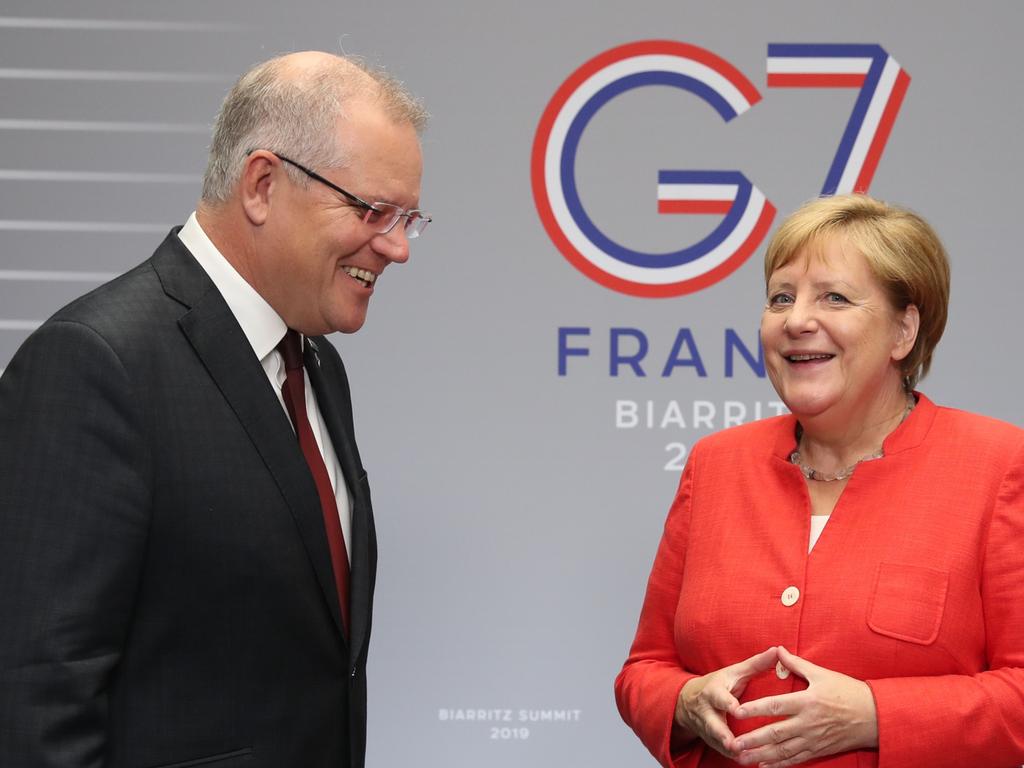


To join the conversation, please log in. Don't have an account? Register
Join the conversation, you are commenting as Logout